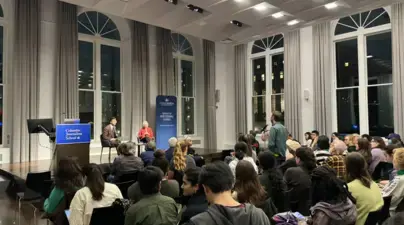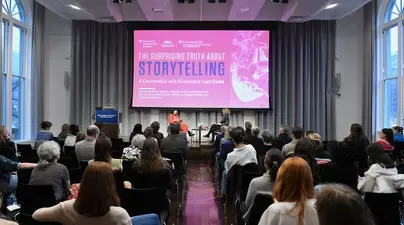Sustainability has become essential for businesses and organizations across all industries. As the world aims for a greener future, companies are increasingly adopting eco-friendly practices. At the same time, consumers are becoming more aware of their environmental impact and seeking out sustainable products and services.
That's among the key reasons Columbia’s School of Professional Studies (SPS) offers the M.S. in Sustainability Management, equipping students with practical knowledge and training them to excel as leaders in this expanding industry. The program covers essential topics such as the physical aspects of sustainability such as water and energy, along with general and financial management, economics, quantitative analysis, and policy.
Not only do the students have the opportunity to learn from experts in the field—including Sustainability Management program director Steven Cohen, who was recently recognized among this year’s Notable Leaders in Sustainability by Crain’s New York Business—but also from numerous lectures and panels at the school.
Here are some highlights from this year’s Sustainability Management program.
Panel on SEC’s Disclosure Rule
On November 13, 2023, a panel moderated by Steven Cohen and Columbia faculty from law, finance, sustainability, and corporate reporting discussed how the SEC's climate disclosure rule will be a game-changer for corporations.
The panelists broke down the SEC’s new disclosure requirements, how companies will meet these requirements, and the impact on financial markets.
As lecturer in the SUMA program Celine Ruben-Salama noted, “Companies are really scrutinizing their efforts, applying more due diligence, and asking, ‘Are we truly implementing these practices in the best possible way?’” She observed that companies are utilizing tools such as third-party verification of carbon emissions and investments in internal data and accounting systems.
Satyajit Bose, professor of professional practice in Sustainability Management, emphasized during the discussion the potential financial impact of the SEC’s rules. He highlighted that if financial markets lack total transparency, the U.S. risks falling behind the EU.
Solving the Biodiversity Crisis
Wendy Hapgood (’17SPS, SUMA), a lecturer in the Sustainability Management program and co-founder and COO of the international conservation nonprofit Wild Tomorrow, moderated a panel about the importance of safeguarding biodiversity, with industry experts including founder and CEO of EQX Biome Matthias Pitkowitz, who shared that he founded the company with the goal of generating investment opportunities that contribute to the conservation of vulnerable ecosystems.
“When we talk about biodiversity, the conversation often becomes lions and tigers and those other banner species,” Pitkowitz said. “But the thing that humanity needs to recognize, and this has already happened at the political level, is that insects and different animals and microorganisms together form really complex things that are the reason that we have an atmosphere and the reason we have a climate and the reason we are able to be here.”
To address biodiversity loss, an estimated $700 billion to $900 billion annually is needed, according to Pitkowitz. “This money does not exist in public funding or in donations. If you offer investors an opportunity to deploy capital and get a little bit more back than they put in, then this funding gap is solved,” he said.

The New York Times climate reporter Raymond Zhong (left) and Claudia Dreifus, an instructor in Columbia's M.S. in Sustainability Management program, answer questions at the "How to Cover the Biggest Story on Earth" panel.
How We Cover the Biggest Story on Earth: Climate Change
Claudia Dreifus, an instructor in Columbia's M.S. in Sustainability Management program, thinks climate change is “the most important story, probably, on Earth.”
But how could you report on that?
She posed that question to New York Times climate reporter Raymond Zhong in a panel named “How We Cover the Biggest Story on Earth: Climate Change.” Zhong is a part of the New York Times team that won a 2021 Pulitzer Prize for their coverage of the COVID-19 pandemic.
Zhong shared that he believes the most difficult climate change challenge is keeping readers engaged.
“I write to engage my friends at the bar,” he said. “It's not policy makers; it’s not people in business. If I can do that with science, to make it feel like you're talking to a friend about it, but it's still informative, it's still accurate, then I've done my job. That's what I aim for.”
ESG and Bioethics: Intersections, Opportunities, and Challenges
“ESG in Bioethics” brought together leaders from both Environmental, Social, and Corporate Governance (ESG) and Bioethics to have a better understanding of the intersections, challenges, and opportunities they present.
Experts moderated by M.S. in Bioethics program director Robert Klitzman shared their strategies for understanding the roles and responsibilities of corporations and other stakeholders, as well as the short- and long-term social and environmental risks and benefits.
Past, Present, and Future: The Role of Life Cycle Assessment in Sustainability Management
According to Fortune Business Insights, the global life cycle assessment (LCA) software market size is booming. "It was valued at USD 202.7 million in 2023 and is projected to grow from USD 230.1 million in 2024 to USD 695.3 million by 2032, exhibiting a CAGR of 14.8% during the forecast period (2024-2032)," the Fortune Business Insights report said.
But how will the evolution of this market drive forward? There is a lot on the table: existing and forthcoming policies, from sustainable fuel standards to carbon offset credits and the European Environmental Footprint, and the development of AI tools as well. What will be the impact for manufacturers and their suppliers?
Dr. Steven Cohen discussed this and more with a panel of experts from both the private sector and Columbia University's own Research Program on Sustainability Policy and Management to address these important questions.
13th Annual Sustainability Symposium from SUMASA (Sustainability Management Student Association)
Where are we spending real time, money, and effort today to drive the changes of tomorrow?
This is the question that has been the thread between the eight panels that animated the 13th Annual Sustainability Symposium held by the Sustainability Management Student Association.
Centered around the theme "Solutions in Action: Delivering Real Change," the symposium functioned as a platform for interdisciplinary exchange of ideas, knowledge, discussions on current events, and industry best practices, aimed at fostering conversations to pave the way for a more sustainable future.
The event brought together corporate professionals, industry leaders, researchers, and students to explore emerging trends.

Science storyteller Lucy Cooke (left) in conversation with moderator Louise A. Rosen at Columbia's Pulitzer Hall.
The Surprising Truth about Storytelling: A Conversation with Broadcaster Lucy Cooke about Science, Satire, Sloths, and Sex
Lucy Cooke, an award-winning science storyteller, shared her insights and experience about science storytelling with Senior Associate Dean of Administrative Affairs and Communications and Lecturer in International and Public Affairs Louise Rosen. They discussed Cooke's dynamic career as a multimedia broadcaster, myth slayer, and science writer.
Cooke has authored four bestselling science books. In her latest work, Bitch: On the Female of the Species, highlights the gender-based bias of esteemed minds such as Darwin and challenges the misconception that females are inherently placid, modest, and monogamous.
The conversation was filtered through Cooke’s distinctive approach to storytelling, which blends science and humor to illuminate important issues entertainingly. As Cooke said, “I particularly like telling stories that make people look at the world differently and also make people laugh.”
What Flaco Taught Us: Thoughts on Urban Wildlife and the Human Connection
At a recent panel, renowned ecologist, author, and conservationist Carl Safina and Claudia Dreifus, a science journalist and instructor in Columbia's M.S. in Sustainability Management program discussed the lessons learned from one of New York City's most talked-about celebrities: the Eurasian eagle owl Flaco.
Safina, renowned for his nine bestselling books about the natural world including Alfie and Me: What Owls Know, What Humans Believe, discussed the broader significance of Flaco’s life in NYC.
This lively event was an open session of Professor Clauida Dreifus’s Writing about Global Science for the International Media class.
Hearst Sustainable Cities Summit
On April 23, the Hearst Sustainable Cities Summit 2024 brought together industry leaders who discussed how innovative designs, policies, and technologies are shaping urban landscapes worldwide.
As cities continue to expand in size and population, their impact on the environment grows more significant. It is increasingly essential to develop strategies that will secure a better future for the next generations.
About the Program
The Columbia University M.S. in Sustainability Management program offered by the School of Professional Studies in partnership with the Climate School provides students cutting-edge policy and management tools they can use to help public and private organizations and governments address environmental impacts and risks, pollution control, and remediation to achieve sustainability. The program is customized for working professionals and is offered as both a full- and part-time course of study.


